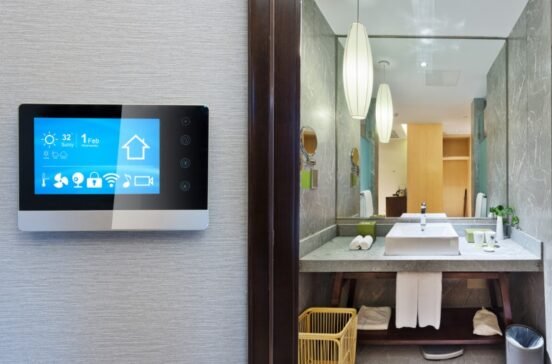Enhancing Lifestyle with Advanced Technology: The Ultimate Guide to a Smart Home
Share

Smart home technology refers to a suite of devices, appliances, or systems that connect to a common network. These can be independently and remotely controlled for enhanced convenience, efficiency, and security in managing household operations and functions.
Advanced technology substantially enhances lifestyle by improving efficiency, convenience and communication. It allows for timely health tracking, easy access to information, telework and travel facilitation, ultimately promoting quality of life.
Smart home automation is a system that uses technology to automate and control home appliances and systems, such as lighting, heating, security, and entertainment. Smart home enables homeowners to manage devices remotely for convenience, efficiency, and safety.
Key Components and Systems of a Smart Home
A smart home integrates advanced automation systems to provide inhabitants with sophisticated technology-enabled responses. It includes components such as automated appliances, security systems, climate control, and entertainment systems, all controlled via mobile apps or voice commands.
Latest Developments in Smart Home Technology
Smart home technology has significantly advanced, with AI-powered devices enabling autonomous control of home functions. High-tech security systems, advanced thermostats, smart speakers, and IoT-based appliances offer enhanced convenience, energy efficiency, and overall home management.
Advantages of Smart Home Technology
Convenience and Comfort
Convenience and comfort are two essential pillars of a satisfied life. They depict the ease and serenity experienced through efficient systems or enjoyable environments, enhancing life quality and reducing stress.
Energy Efficiency
Energy efficiency refers to the method of reducing energy consumption by utilizing less energy to provide the same service. It plays a crucial role in slowing down global warming and reducing carbon emissions.
Enhanced Security and Safety
Enhanced security and safety are vital in various environments, including workplaces, residential areas, and public places. Implementation of improved security measures like surveillance cameras, alarm systems, and access control offers protection against potential threats, ensuring peace of mind.
Integrating Smart Devices into Your Home
Selection of Smart Devices Suitable for Your Needs
Choosing the right smart devices requires careful evaluation of your lifestyle and technological needs. Consider factors such as compatibility, functionality, user-friendliness and price for an optimal smart home experience.
Installation Process of Different Smart Devices
The installation process of different smart devices typically involves connecting the device to a power source, pairing it with a compatible smartphone or hub via Wi-Fi or Bluetooth, and setting up functions through a corresponding application.
Pairing and Integrating Smart Devices to Build a Single Cohesive System
Pairing and integrating smart devices allows for a seamless and efficient ecosystem. This cohesion enhances functionality, convenience, and potential for automation, elevating our user experience in the smart home or office environment.
Operating and Maintaining a Smart Home
Operating and maintaining a smart home involves regular updates of devices and applications, fixing connectivity issues, troubleshooting technical problems, and ensuring the security of home automation systems for optimized and safe usage.
Troubleshooting Common Smart Home Issues
Troubleshooting smart home issues involves diagnosing and fixing problems with various IoT devices. These issues may include connectivity or configuration problems, software/hardware malfunctions, or compatibility issues between different devices. Effective troubleshooting requires proper knowledge and skills to ensure seamless smart home operation.

Enhancing Lifestyle with Advanced Technology: The Ultimate Guide to a Smart Home
Future of Smart Homes
Potential Advancements in Smart Home Technology
Smart home technology advancements may revolutionize our residential routines. Potential improvements include automated energy-efficient systems, advanced security features, voice-controlled appliances, and AI-integrated household management for more convenient, secure, and sustainable living.
Indicative Impact of These Advancements on Lifestyle
Advancements in technology, medicine, and agriculture have greatly improved our lifestyle. They’ve significantly increased convenience, improved health and longevity, and bolstered food security, making our lives more efficient and comfortable.
Role of Artificial Intelligence in Shaping Future Smart Homes
Artificial intelligence plays a crucial role in shaping future smart homes by enhancing energy efficiency, security and convenience. It allows automation of tasks, predictive maintenance, and personalized user experience, revolutionizing home management.
Read More:





